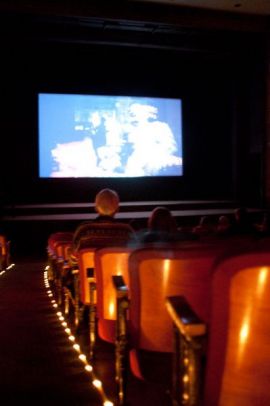In an era where mainstream Hollywood films often dominate the movie theaters, Cornell Cinema offers what other theaters don’t: history.

Since the ’70s, Cornell Cinema has been a staple in Ithaca’s film community. This year the cinema is celebrating 40 years as a venue devoted to showing independent, foreign and second-run Hollywood films.
Mary Fessenden, the cinema director, said Cornell University’s Willard Straight Hall, where most of the cinema’s events are held, gives the cinema an authentic feel. With murals on the wall, balcony seating and screen masking, Cornell Cinema gives viewers an experience unlike any mainstream theater.
“This aspect of the theater allows them to frame an image in black, which creates an illusion of the image floating in space,” she said. “This means viewers can really immerse themselves in the experience of watching a film, which makes it that much more enriching.
More than 30,000 people come to Cornell Cinema to get this experience. Chris Riley, the cinema manager, said offering a broad range of films as well as the quality of the projection is what makes the cinema unrivaled by other theaters.
“We’re showing everything from classic Hollywood to experimental to documentary over the course of a week,” he said. “We’re constantly changing. The care we put into the theater experience and the projection is unsurpassed.”
Fessenden said Cornell Cinema is the only theater in town with a reel-to-reel 35 mm projector. Most mainstream theaters use a platter projection system.
“We are allowed to show archival and other rare prints that require special handling,” she said. “Having dedicated projectionists working each screening also means that the quality of the projection at Cornell Cinema is the best in town.”
The cinema also gives members of the Ithaca community the ability to showcase their own films. Cathy Lee Crane, associate professor of cinema, photography and media arts at Ithaca College, showed two of her own films in the past five years at the cinema. She said the cinema provides a supportive environment for the community to meet with local moviemakers.
“Cornell Cinema makes possible the direct encounter with contemporary practitioners,” she said. “[It’s an] innovative cinema. Its visiting filmmaker series alone is an extraordinary opportunity that is central to central New York. You would otherwise have to go to Manhattan, and even then you don’t necessarily have the same sort of concentrated and intimate opportunity to meet with people who have gone on to have prestigious careers as producers and editors in the industry.”
Fessenden said this year’s Elegant Winter Party, which will be held Saturday at 7:30 p.m. in Willard Straight Theatre, will emphasize the fundraising aspect of the party more so than in years past. For the first time in the 20 years that the Cornell Student Assembly has been funding the cinema, the SA will be cutting the cinema’s budget.
The SA is given $204 from every student to go toward clubs and organizations. Rammy Salem, president of the SA, said the group is cutting the original allocation of $11 per student to the cinema to $10 per student.
“Professors use [the cinema] in the classes to supplement students’ education,” he said. “Given that that’s the case, it should not be as reliant as it currently is on … the students.”
Fessenden said the theater gives back to the community in many ways.
“It is a very popular program,” she said. “It didn’t make a lot of sense why they cut our funding. To see cutbacks or the elimination of any of [the programs] would be a loss and make Ithaca a less interesting place to live.”
With the cinema losing $13,000 out of its $500,000 budget while showing close to 300 films a year, the cinema might not be able to survive the cuts without outside help. Fessenden said the first programs that might be cut are the events that bring filmmakers and speakers to Ithaca. This may become a problem when the budget cuts go into effect at the start of the next academic year.
“If we are unable to come up with replacement funding for the $13,000 loss, we will have to cut back on specialty programming like visiting filmmakers and live music events, in addition to screening fewer specialty films that tend to attract smaller audiences — things that make Cornell Cinema so special,” she said.
Erica Titkemeyer, a senior cinema and photography major at Ithaca College, serves as the college’s liaison to the cinema with the task of advertising to the college community about the cinema’s events. She said Cornell Cinema is a good resource for students on campus and it shouldn’t suffer from budget cuts.
“[The cinema] is important for anyone who’s an activist looking to watch a documentary. … You can find your little niche there,” she said. “It’s definitely an under-recognized resource for the community.”
Crane said mingling between experimental filmmakers as well as graduates from Cornell adds to the independent and local feel of the cinema — something mainstream theaters lack.
“It’s a one-of-a-kind opportunity that brings the whole breadth of cinematic practice to our doorstep,” she said.




